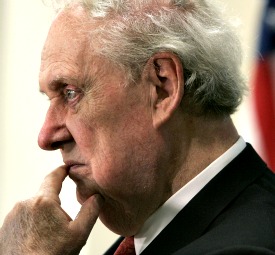Remembering Judge Bork (1927-2012)
COMMENTARY: An Ave Maria colleague recalls Robert Bork's impact in the classroom.

One of the great joys in my life was getting to know Judge Robert Bork and call him a friend. When I was organizing Ave Maria School of Law, he was the first faculty member announced as part of our law school. The significance of that appointment cannot be overstated. He gave us instant credibility as a serious institution, one committed to serious legal study, and his appointment enabled us to attract outstanding law students who wanted exposure to him.
He made it clear to me that he did not want to teach a regular law course, not even "Anti-Trust," which he had so profoundly shaped. Rather, he wanted to do something different.
Out of our conversations developed a special course called “Moral Foundations of Law,” a course that was required of all first-year law students. Although it covered such subjects as natural law, legal enforcement of morals, capital punishment and similar issues, the thrust of the course was the wit and wisdom of Judge Robert Bork.
He and I team-taught the course; I was as much a student as any other member in the class. Bork’s point of view was that judges were bound by the text of the statute and were required to follow it — in contrast to judicial activists who would search for ways to avoid following the dictate of the statute. He showed the students how legal philosophy would likely influence their future decisions if they served on the bench.
The U.S. Supreme Court’s decision in Roe v. Wade helped to clarify this point. There is nothing in the Constitution that upholds the constitutional right to abortion. It was clearly fabricated by a group of judges who wished to impose their moral views on the country without any constitutional grounding.
Each year at the end of the course, we would open up the last class to any questions the students wanted to ask him about his career, the law, the culture, the battle over his Supreme Court nomination and any other subject they wished. Bork would sit and answer directly each and every inquiry, no matter what the nature of the question was.
What a joy it was to participate in that class with Robert Bork. He was without a doubt one of the finest legal minds of the 20th century, and he coupled that with the ability to speak and write with a precision and clarity matched by very few. He also was a formidable debater. It was particularly interesting in class to watch him debate students who wished to challenge him, challenges he encouraged to draw from them legal thinking required by good lawyers and to teach them to think with the precision and clarity that he did.
In my 40 years in legal education, Bob Bork was the best teacher I encountered. What a benefit he was to our students.
As I got to know him, I also realized how wrong the caricatures were of him offered by political opponents or in the media. Beneath that gruff exterior was a very funny human being. He truly enjoyed the give-and-take with others and did it with levity and wit.
In all the years that we worked together, I can only remember one serious disagreement with Judge Bork. That disagreement was a profound one, and it was over the proper nature of the martini, a subject which was near and dear to his heart. He was appalled that I preferred a vodka martini with olives and anchovies, and even better if the olives had bleu cheese. He insisted, however, that the only proper martini was made with gin, a small amount of vermouth and a lemon twist. Anything else was a sign that you had activist tendencies. A true originalist, he claimed, would only order and drink the martini as he described it. What I was drinking was a liquid salad, not a martini.
I will miss him greatly for his friendship and his participation as a member of the faculty of Ave Maria School of Law. I will also miss him for his kindness, good humor and ability to handle adversity with grace and dignity.
Bernard Dobranski is the dean emeritus of Ave Maria School of Law
and its founding president. He is the former dean of
The Catholic University of America School of Law.













